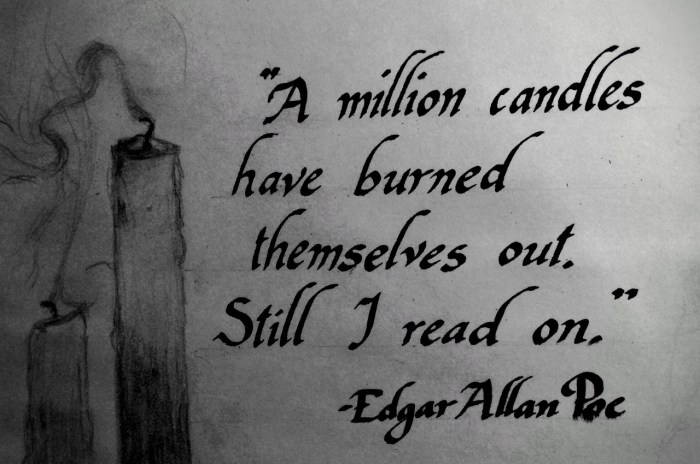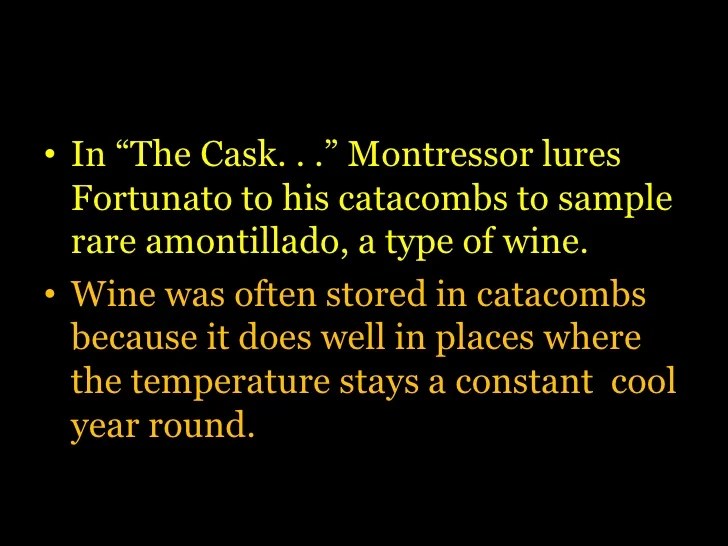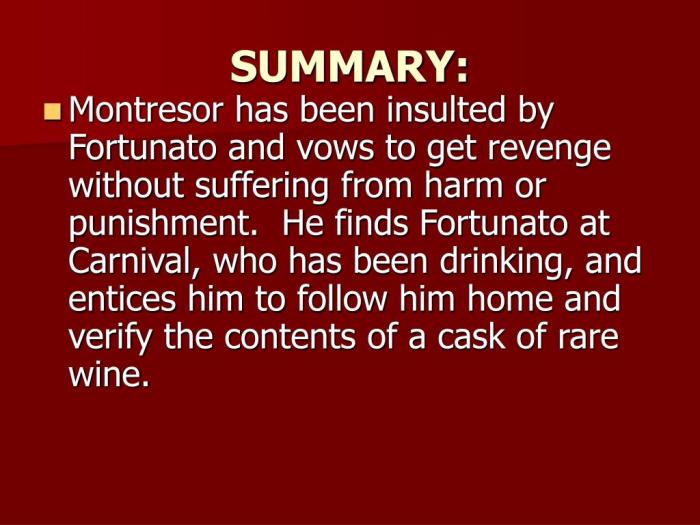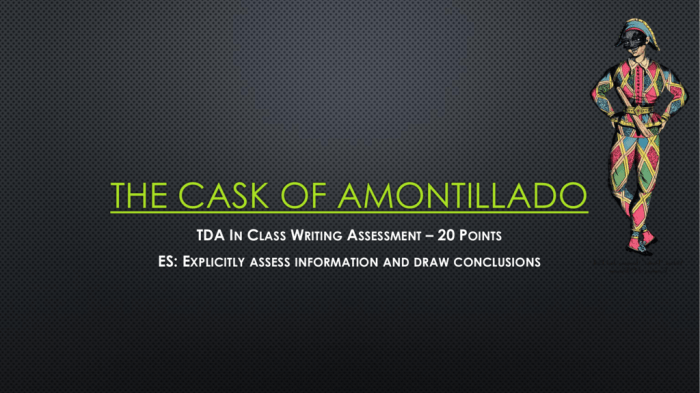Quotes from the cask of amontillado – “The Cask of Amontillado” by Edgar Allan Poe is a chilling tale of revenge and retribution. This essay delves into the rich tapestry of quotes that illuminate the story’s setting, characters, symbolism, and themes.
From Montresor’s vengeful nature to Fortunato’s tragic fate, these quotes provide a profound insight into Poe’s masterful storytelling and the enduring legacy of this classic work.
Quotes Related to Montresor’s Revenge: Quotes From The Cask Of Amontillado

Edgar Allan Poe’s “The Cask of Amontillado” depicts the vengeful nature of Montresor, who meticulously plans and executes a gruesome act of retribution against his perceived wrongdoer, Fortunato.
The following quotes illustrate Montresor’s vengeful mindset and the significance of his actions:
Montresor’s Declaration of Vengeance
- “The thousand injuries of Fortunato I had borne as I best could; but when he ventured upon insult, I vowed revenge.”
This quote establishes Montresor’s determination to seek retribution for the perceived offenses he has suffered at Fortunato’s hands. The use of the word “insult” suggests that Montresor considers Fortunato’s actions to be particularly egregious, justifying his extreme response.
Montresor’s Cunning Plan
- “I must not only punish, but punish with impunity.”
This quote reveals Montresor’s careful consideration of his plan for revenge. He is determined to inflict punishment on Fortunato without risking any repercussions for himself. This demonstrates his cunning and manipulative nature.
Montresor’s Satisfaction in Fortunato’s Agony
- “In pace requiescat!”
This Latin phrase, meaning “May he rest in peace,” is spoken by Montresor as he seals Fortunato behind the wall. It is a mocking epitaph that underscores Montresor’s lack of remorse for his actions. The use of a religious phrase adds an ironic layer to his cruelty.
Montresor’s Triumphant Conclusion
- “My heart grew sick;– but nothing moved me from the purpose at hand.”
This quote shows that Montresor is aware of the horror of his actions, yet he remains unwavering in his resolve. The use of the word “sick” suggests a brief moment of hesitation, but Montresor’s determination ultimately prevails.
Quotes Demonstrating the Setting and Atmosphere

Edgar Allan Poe’s “The Cask of Amontillado” takes place in the eerie and claustrophobic setting of the catacombs beneath an unnamed Italian city. The following quotes vividly describe the setting and contribute to the story’s suspenseful atmosphere:
The Catacombs’ Darkness and Dampness
- “The catacombs were large and winding, and they were filled with a dense darkness that made it difficult to see.”
- “The air was heavy with the smell of damp earth and decay.”
These quotes convey the oppressive and suffocating atmosphere of the catacombs, creating a sense of unease and claustrophobia. The darkness and dampness add to the sense of mystery and foreboding, making the reader feel as though they are trapped with Montresor and his victim.
The Catacombs’ Narrow and Twisting Passages
- “The passages were narrow and winding, and they twisted and turned in all directions.”
- “It was easy to get lost in the catacombs, and it was even easier to be trapped.”
These quotes describe the labyrinthine nature of the catacombs, creating a sense of disorientation and confusion. The narrow and twisting passages make it difficult to escape, adding to the suspense and fear of the situation.
Quotes Revealing Fortunato’s Character

Fortunato, the enigmatic companion of Montresor, emerges as a complex character through his witty remarks and enigmatic behavior. His arrogance and love of wine are evident in numerous quotes throughout the tale, foreshadowing his tragic fate.
Fortunato’s Arrogance
- “I drink to the buried that repose around us.”– Fortunato’s flippant toast to the deceased beneath their feet reveals his disregard for the dead and his own mortality.
- “The man is a fool who does not keep his wine at a proper temperature.”– Fortunato’s condescending attitude towards Montresor’s wine knowledge highlights his inflated sense of expertise.
Fortunato’s Love of Wine, Quotes from the cask of amontillado
- “I am Fortunato, the man who has drunk all the Amontillado in your cellars.”– Fortunato’s boastful proclamation emphasizes his obsession with rare and exquisite wines.
- “Amontillado! You have been imposed upon. And as for Luchesi, he cannot tell Amontillado from Sherry.”– Fortunato’s dismissive comment about Luchesi reveals his unwavering belief in his own superior palate.
These quotes, taken together, paint a vivid portrait of Fortunato as a man consumed by his pride and his love of wine. His arrogance and overconfidence ultimately lead him into Montresor’s trap, setting the stage for his tragic demise.
Quotes Illustrating the Symbolism of the Cask

The cask of Amontillado in Edgar Allan Poe’s short story of the same name is a powerful symbol with multiple layers of meaning. It represents entrapment, revenge, and ultimately, death.
The cask’s physical characteristics contribute to its symbolic significance. It is described as being “immense,” “puncheon,” and “hogshead,” suggesting its size and weight. This physical bulkiness can be seen as a metaphor for the burden of guilt and revenge that Montresor carries.
The Cask as a Symbol of Entrapment
The cask is also a symbol of entrapment. Montresor lures Fortunato into the catacombs under the pretense of tasting some rare Amontillado. Once they are underground, Montresor chains Fortunato to the wall and proceeds to wall him up alive. The cask becomes a symbol of the trap that Montresor has set for his victim.
“The thousand injuries of Fortunato I had borne as I best could; but when he ventured upon insult, I vowed revenge.”
This quote reveals Montresor’s motive for revenge and his willingness to go to any lengths to achieve it. The cask becomes a tool for carrying out his plan.
The Cask as a Symbol of Revenge
The cask is also a symbol of revenge. Montresor’s plan to wall up Fortunato alive is a carefully calculated act of vengeance. He takes his time, savoring each moment of his victim’s suffering.
“I thrust a torch through the remaining aperture and let it fall within. There came forth in return only a jingling of the bells. My heart grew sick; it was the dampness of the catacombs that made it so. I hastened to make an end of my labor. I forced the last stone into its position; I plastered it up. Against the new masonry I re-erected the old rampart of bones. For the half of a century no mortal has disturbed them.”
This quote describes the final act of Montresor’s revenge. He walls up Fortunato alive, leaving him to die in the darkness. The cask becomes a symbol of the finality of Montresor’s revenge.
The Cask as a Symbol of Death
Finally, the cask is a symbol of death. Fortunato’s death is a gruesome and violent affair. He is walled up alive, left to die in the darkness. The cask becomes a symbol of the inevitability of death and the finality of Montresor’s revenge.
“In pace requiescat!”
This Latin phrase, meaning “May he rest in peace,” is the final line of the story. It is a chilling reminder of the fate that has befallen Fortunato. The cask becomes a symbol of the finality of death and the futility of revenge.
Quotes Highlighting Poe’s Writing Style

Edgar Allan Poe’s writing style is characterized by its vivid imagery, haunting atmosphere, and masterful use of language. In “The Cask of Amontillado,” Poe’s prose showcases his exceptional craftsmanship, creating a story that lingers in the reader’s mind long after the final page is turned.
Poe’s mastery of language is evident in his use of alliteration, assonance, and consonance. These literary devices create a musicality that enhances the story’s atmosphere and impact. For example, the repetition of the “s” sound in the following passage adds to the sinister tone:
Use of Alliteration
“The thousand injuries of Fortunato I had borne as I best could, but when he ventured upon insult, I vowed revenge.”
Poe’s use of imagery is equally impressive. His descriptions are so vivid that the reader can almost see, hear, and smell the events of the story. In the following passage, Poe uses the sense of smell to create a sense of foreboding:
Use of Imagery
“The air was cold and damp, and the walls were lined with nitre. I found that the atmosphere was oppressive.”
Poe’s writing style in “The Cask of Amontillado” is a perfect example of his mastery of the craft. His use of language, imagery, and atmosphere creates a story that is both haunting and unforgettable.
Quotes Demonstrating Irony and Foreshadowing

In “The Cask of Amontillado,” Edgar Allan Poe employs irony and foreshadowing to create a complex and suspenseful narrative. These literary devices provide hints and clues that subtly suggest the story’s tragic outcome, adding depth and intrigue to the plot.
Irony
Irony occurs when a situation or statement has a different or opposite meaning from what is expected or intended. In the story, Montresor’s comments and actions are often ironic, highlighting his duplicity and the impending doom of Fortunato.
- “My dear Fortunato, you are luckily met. How remarkably well you are looking today!” (p. 202)
- “I have received a pipe of what passes for Amontillado, and I have my doubts as to its genuineness.” (p. 202)
- “I will not impose upon your good nature. I perceive you have an engagement. Luchesi expects you?” (p. 204)
Foreshadowing
Foreshadowing is the use of hints or clues to suggest events that will happen later in the story. Poe employs several instances of foreshadowing in “The Cask of Amontillado,” creating a sense of suspense and inevitability.
- “I must not only punish, but punish with impunity. A wrong is unredressed when retribution overtakes its redresser.” (p. 201)
- “The moisture of the catacombs insidiously affected me, although the fires of my revenge consumed me.” (p. 203)
- “I threw upon his head a few feeble and indefinite expostulations; and, having dropped the lantern, proceeded to retrace my steps.” (p. 204)
These quotes, among others, contribute to the narrative’s intricate structure, enhancing its impact and leaving a lasting impression on the reader.
Quotes for Comparative Analysis
The following quotes from “The Cask of Amontillado” lend themselves to comparative analysis with similar quotes from other works of literature, shedding light on universal themes and literary techniques.
Revenge and Betrayal
“The thousand injuries of Fortunato I had borne as I best could, but when he ventured upon insult, I vowed revenge.”
This quote encapsulates Montresor’s deep-seated desire for vengeance, a theme explored in numerous works of literature. It mirrors the sentiments of characters like Hamlet in Shakespeare’s eponymous play, who seeks retribution for the murder of his father.
The Power of Darkness
“The crypt of the Montresors was indeed a vast catacomb of bones.”
Poe’s depiction of the setting as a macabre and claustrophobic underground chamber evokes a sense of darkness and dread. Similar imagery is found in H.P. Lovecraft’s “The Call of Cthulhu,” where the ancient and subterranean city of R’lyeh exudes an atmosphere of cosmic horror.
The Folly of Pride
“I was not only a mason, but I was a Connoscento—taste in wines.”
Fortunato’s boastful declaration highlights his arrogance and excessive pride. His hubristic nature ultimately leads to his downfall, as it does for characters like Lucifer in Milton’s “Paradise Lost” and Gatsby in Fitzgerald’s “The Great Gatsby.”
The Symbolism of Entrapment
“The Cask of Amontillado”
The titular cask serves as a powerful symbol of entrapment and confinement. It mirrors the metaphorical imprisonment of characters like Raskolnikov in Dostoevsky’s “Crime and Punishment” and the protagonist in Kafka’s “The Metamorphosis.”
FAQ Compilation
What is the significance of the setting in “The Cask of Amontillado”?
The catacombs represent the dark and claustrophobic nature of Montresor’s revenge, as well as the entrapment of both characters in their own desires.
How does Fortunato’s character contribute to the story’s irony?
Fortunato’s arrogance and love of wine lead him to underestimate Montresor’s intentions, ultimately resulting in his own demise.
What is the symbolic meaning of the cask of Amontillado?
The cask represents both the object of Montresor’s revenge and the vessel that contains Fortunato’s fate, symbolizing entrapment, death, and the inevitability of retribution.